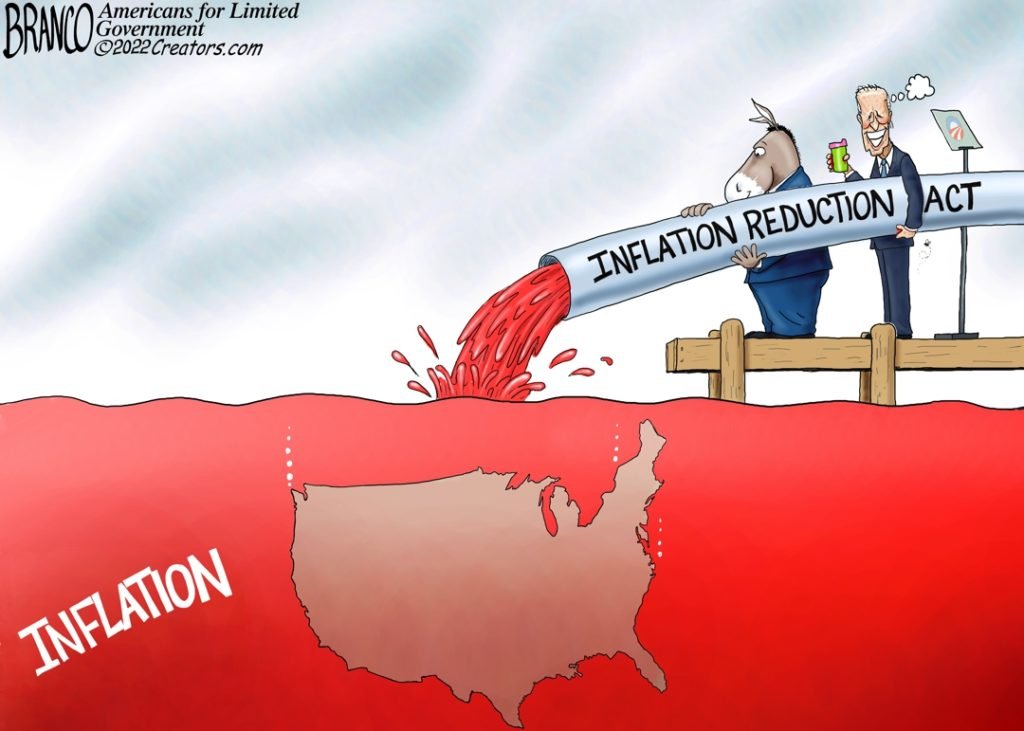Inflation Reduction Act Will Stall Economic Growth

On January 1st, the provisions of the Inflation Reduction Act (IRA) will take effect. President Biden said this act will reduce prices for Americans and vastly increase spending to fight climate change. Since Biden did not want to create any excess demand that results from increased government spending, he raised taxes on business.
Biden has consistently said that corporate America must pay their fair share of taxes, although he has never defined exactly what fair share means. He does say that one year 55 of the largest corporations paid no federal income tax one year, even though they made billions in profit.
To fix this, he has imposed a 15% minimum tax on most corporations (manufacturing businesses are excluded). No longer will multi-billion-dollar corporations be able to pay no taxes when profits are earned.
He also noted that when taxes were reduced in 2018 under the prior administration, the reduction in the corporate tax rate was designed to provide additional capital for firms to invest. Instead, many firms used the capital to buy back shares from existing stockholders. The IRA put an additional excise tax on these transactions.
Unfortunately, the reality is that these tax increases will reduce capital formation, tend to slow economic growth and will put upward pressure on prices making inflation worse not better.
Why did some multi-billion-dollar corporations not pay taxes?
Most of it is because of depreciation. That means if a company invests say $100 million dollars in a project building a facility, that money comes from income earned after paying taxes. As such the firm can get the capital out of the project over time, through depreciation. Without depreciation, the firm would be paying taxes on capital that was already taxed.
Suppose the government allows the company to pull out $4 million per year for the next 25 years which returns the entire $100 million dollar investment. Suppose the company had a profit one year of $3 million. When the depreciation expense is added in the $3 million profit turns into a $1 million dollar loss.
The company would pay no taxes that year and would have $4 million to reinvest. This provides capital for expansion. Without the depreciation, and with a 15% minimum tax, there would be less capital recovery. In a capital-intensive economy this slows economic growth.
The excise tax on stock buybacks would similarly reduce capital formation. Biden’s excise tax is intended to reduce stock buybacks, because he believes that this only enriches stockholders. That’s not exactly the way it works.
When the corporate tax rate was reduced in 2018, corporations’ profit after tax increased. That creates more retained earnings and should increase corporate investment. Instead many corporations simply repurchased some shares of stock from existing stockholders. This is a good thing to happen and will lead to higher economic growth.
If the corporations finds that it has only marginal investment opportunities, some stockholders will offer to sell their stock back to the corporation. They do that because those stockholders find there are other investment opportunities that yield very high returns. The higher returns are a result of greater need for capital.
Stock buybacks end up improving the efficiency of capital. That leads to higher economic growth. If circumstances are such that stockholders can find a better use for the capital than the corporation, buybacks allow those stockholders to take advantage of better opportunities.
The alternative is to increase dividends to all stockholders, many of whom do not want the increases dividends because it incurs a tax liability and because they want their funds to stay in the corporation. The stock buyback will raise the price of the stock for the remaining stockholders, with no tax liability.
It is crucially important that the U.S. economy create as much new capital as possible. We already have a capital intensive economy and with the labor shortage resulting in capital replacing labor, more capital will be needed in the future.
The IRA reduces capital formation, which slows economic growth. This will result in less total supply in an economy where the federal government adds to excess demand by deficit spending. That leads to higher prices every time.
The IRA will make inflation worse, not better.
This article was first published on Newsmax.
Agree/Disagree with the author(s)? Let them know in the comments below and be heard by 10’s of thousands of CDN readers each day!
Read More: Inflation Reduction Act Will Stall Economic Growth

